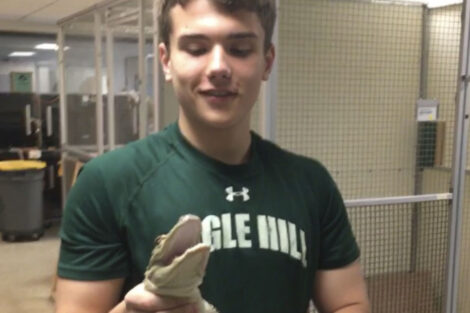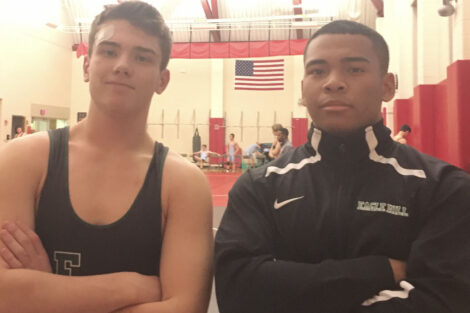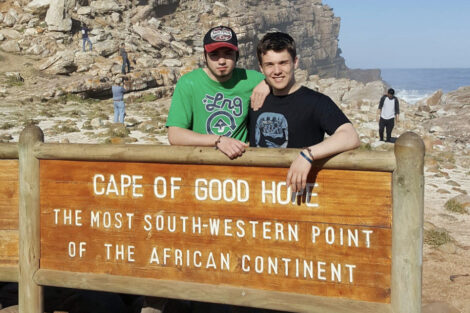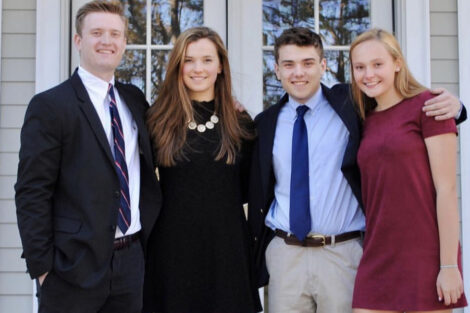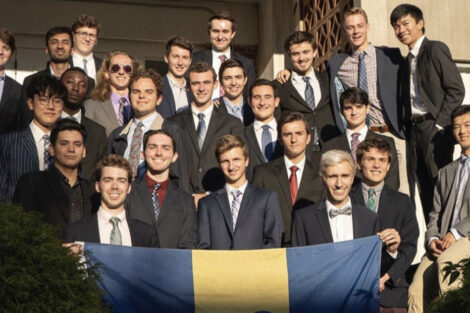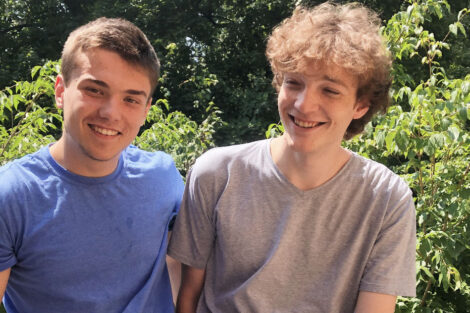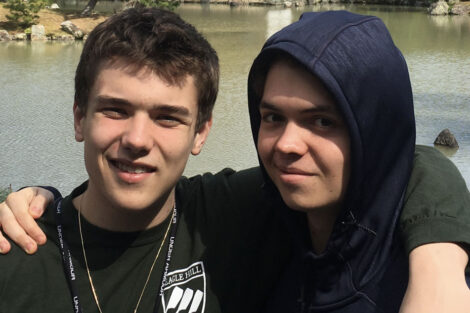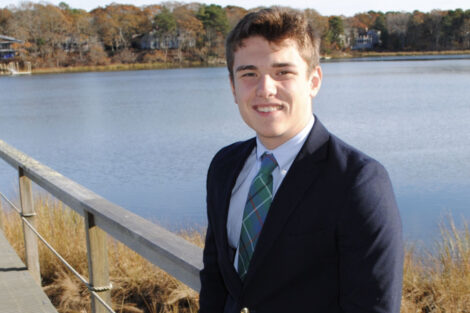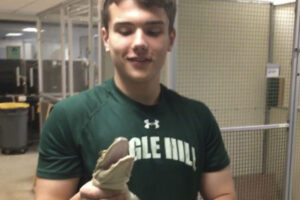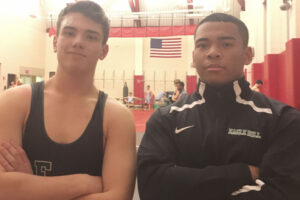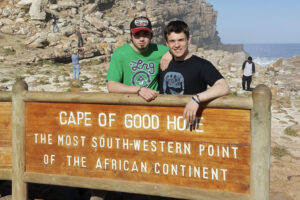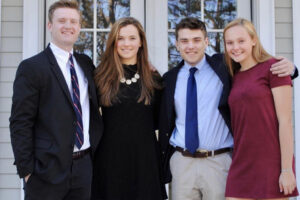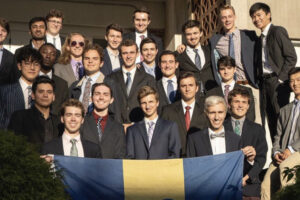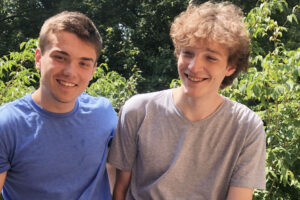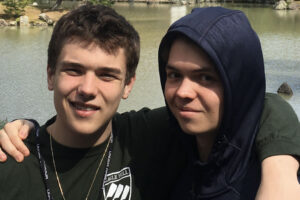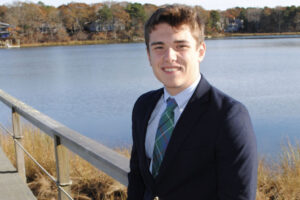What’s your family and home background?
I grew up in Sudbury, Massachusetts, and this is where my parents still live. Although all my siblings and I went to boarding school, so none of us have lived at home since the age of 14. I have an older brother, Riley, who is 24, as well as two sisters: Mackenzie, who is 26, and Lainie, who is 17. I currently don’t have any pets, but I used to have a beta fish named Goliath.
What's your research project with Prof. Chris Phillips?
I am currently working on two things with Professor Phillips. First, I am helping transcribe ledgers from the Easton Library Company database that date back to around the early 1800s. I also have been working on this project for a while concerning the Shakers of Harvard and Shirley. I started off this project by transcribing their church records at the American Antiquarian Society. Then I traveled around to the old Harvard and Shirley Shaker villages and met with some of the people who live there now, and now I am almost done with a paper about them that I plan to publish.
What’s the research you’ve been doing with Prof. Lisa Gabel?
So I have been working with both Professor Gabel and Professor Phillips since my freshman year. Since you can’t hold two EXCEL jobs at the same time, I switched off between doing independent study and EXCEL for both of them. I mostly work with both of them because I find the work to be enjoyable, fulfilling, and interesting.
The work that I have been doing with Professor Gabel most recently has been on our new CNTNAP2 mice. I put them through a configuration of mazes called the Hebb-Williams Maze. The CNT gene is a candidate gene for a number of disabilities, most notably dyslexia and autism. Dr. Gabel has done research with mice with a different candidate gene for dyslexia being the DCDC2 gene. Professor Gabel has compared the results of mice with and without the DCDC2 gene to children completing the same maze but virtually. The idea is to see if the Hebb-Williams maze is a valid diagnostic tool for dyslexia and dyslexia susceptibility in pre-readers. This is significant because there is no proven tool out there that can assess prereaders for a risk for dyslexia. I stayed about a week after everyone left for quarantine but had to stop the research because they closed the academic buildings.
Why are you so interested in research?
I have been working with kids with dyslexia for a while now. During summer 2017 I worked at the Carroll School, a school for kids with learning disabilities, as a camp counselor. The following year I worked as an intern in their Targeted Cognitive Intervention program, which is in collaboration with scientists at MIT. In this program, I administered a series of remediation programs. Furthermore, I have a learning disability, and my family has a history of learning disabilities. Because of this, I thought that it was an important field to contribute to.
I’ve always been interested in history, but my interest in archival research is much more recent. I began working in the archives in high school in this class called Word Experts, which led to the creation of my book. Our teacher, Dr. Nym Cooke, brought us to the American Antiquarian Society. Along with the help of archivists, each student found something in their collection that no one has written about. In my case, I chose to transcribe and write about a diary that was said to be haunted. This class made an incredible impression on me because I realized how many interesting things there are about history that no one knows about and can be discovered in the archives.
Talk about the book you co-edited about stories of early American culture.
So Dr. Nym Cooke and I began working on Prizefighters, Mediums, and Slave Auctioneers my junior year of high school, and it was actually finally published in the spring semester of my freshman year at Lafayette. It is a compendium, meaning that we compiled excerpts from a variety of papers from the World Experts class and edited them into this collection. It is meant to show how interesting archival research can be and to inspire other people to dive into the archives as well. I really recommend people check it out; they can purchase it on Amazon and Barnes and Noble. The topics in this book range from an illegal bare-knuckle boxing match in New York to unethical opium experiments at the University of Pennsylvania in 1803 to a spirit photographer who photographed Mary Todd Lincoln with the supposed ghost of her husband behind her. These are just some of the interesting and diverse topics that make up the book.
Why do you enjoy wrestling?
I have been wrestling for a really long time. I always enjoyed it for a couple of reasons. Firstly, it is a great workout, and it pushes you to your limits. In my childhood, I was incredibly overweight, and when I started wrestling it motivated me to lose about 30 to 40 pounds and to get into shape. Because of this the sport incidentally gave me confidence. Also, out of every sport I have ever tried it is probably the one I am the most motivated in and best at. I’m happy I’ve been able to continue to practice my technique every week at the wrestling club, and I’m proud to be president of the club.
What do you value most about your membership in DU?
The friendships I’ve made and the support systems in place within the DU brotherhood have proved to be incredibly valuable to my mental health and social well-being. In the middle of my freshman year, I considered transferring to another college because I had trouble connecting with the campus community, and I had trouble making meaningful social connections. After going through the transfer application process, I decided last minute to try to give staying at Lafayette another shot. After rushing in the fall I quickly realized that Delta Upsilon’s close brotherhood was exactly the type of community I was looking for. I owe a great deal to DU, and I was excited to get to live in the house this fall, but sadly COVID intervened in those plans.
What are your career plans and hopes?
I’m not entirely sure what I am going to do after college, but most likely I am going to go to medical school to become a psychiatrist. Another possibility that I am considering is to go into dyslexia research and continuing my work in academia.
What's been most meaningful to you in your education as an English major?
Something that I’ve loved about being an English major is that it has forced me out of my comfort zone to read books that in my free time I would have normally never read. Taking English classes has allowed me to learn from and discover authors who were completely alien to me before. In this way, I have learned about cultures and experiences that have overall increased my understanding of the world on a greater scale.
And how about neuroscience?
I initially decided to study neuroscience as a major because I was interested in how the brain works and the neurological processes that cause us to do what we do. Being a part of the neuroscience major has been incredibly insightful for many reasons. It has forced me to think more deeply about philosophical issues such as consciousness and free will as well as push myself mentally to understand the brain on many different levels.
What was your favorite class last school year?
Probably Abnormal Psychology as it was really interesting to learn more about extreme psychological conditions. It also influenced me to get on the pre-med track and possibly pursue a career in psychiatry in the future.
Who are a couple of professors who have made a big impact on you?
Professor Phillips and Professor Gabel have both been very supportive of me throughout my education at Lafayette. Both of them are my advisers, and without them, I wouldn’t be nearly as successful and driven at Lafayette. They also have both given me great opportunities to work with them on their fascinating research projects.
Professor Phillips was my FYS professor. The class was titled Stories from the Archive. It was a really engaging class, and I highly recommend to any incoming freshman to sign up for this class. Turns out Professor Phillips also had spent time doing research at AAS. Before coming to Lafayette, I was told by people working at AAS to introduce myself to Professor Phillips. I actually completely forgot about this coming to Lafayette and just coincidentally signed up for his FYS because it seemed to align most with my interests.
I initially learned about Professor Gabel and her research on the Lafayette website. When I learned that she was conducting groundbreaking research on dyslexia, the reason I got into neuroscience in the first place, I knew I had to work in her lab. I have been so fortunate to work with her. She has given me many opportunities such as letting me stay at Lafayette over last summer to help in research as well as letting me travel with her to Chicago to attend the Society for Neuroscience conference.
Who’s a staff member you’ve connected with?
I have always been friendly with one of the workers at Marquis, Michael Kramlich. He is also a big fan of wrestling, so we often talk about recent matches. He was even nice enough to buy tickets for some of the guys on the wrestling club to go see a duals match between Penn State and Lehigh.
What was the highlight of the school year for you?
Going through the rush process and joining DU. Another highlight I would have to say was Laf-Lehigh, and seeing us win against them was amazing. I am incredibly sad that we have to put the rivalry on pause for the first time since 1896.
What's your funny Lafayette story?
This is going to make me sound really dumb, but one time at the beginning of sophomore year right after the club fair I lost my backpack and ran around campus looking for it for like eight hours. I ended up waking up early the next day to look for it again and found it pretty quickly in RISC.
Who is the most interesting person you've met at Lafayette?
I have met a lot of very interesting people at Lafayette. At such a prestigious school you’re certain to find a variety of characters with unbelievable experiences and talents. So it is hard to choose just one person. At Lafayette, I’ve met a person who speaks nine languages, a powerlifter, a rapper, a mariachi singer, and an app developer. That is only the tip of the iceberg when it comes to the type of people who make up Lafayette’s campus. That’s probably what I love the most about college and my experience at Lafayette: having the opportunity to meet such an interesting range of people. I guess if I had to choose one person it would probably be Nobuyuki Tsujii, the blind concert pianist, when he came to perform at our school with the Orpheus Chamber Orchestra. I find his ability to become a world-renowned concert pianist despite the odds is really inspiring.
What did I miss?
I have a lot of experience as an animal caretaker. In high school, I used to be in charge of taking care of all of the animals and plants in the science department, including the school aquarium, the variety of plants around the school, and our rare P. rubriventris turtles. We actually worked with Massachusetts Department of Wildlife and Fishery as part of their Head Start program, where we raised the aforementioned Red-Bellied Cooter turtles each year until they were large enough to be released into the wild. Each year everyone in the program at my school went to Mass Wildlife and helped tag, weigh, and measure the carapaces of all the turtles in the Head Start program. I also did a study for them testing the source water quality of all the tanks that the turtles were in to see if there was any correlation between water quality and growth. I also worked for two different summers in the Live Animal Center section of the Boston Museum of Science. This experience was really amazing as I got to work with some crazy animals like alligators and large boa constrictors. I also for the past two years have been one of the people who takes care of the lab animals in Oechsle.
